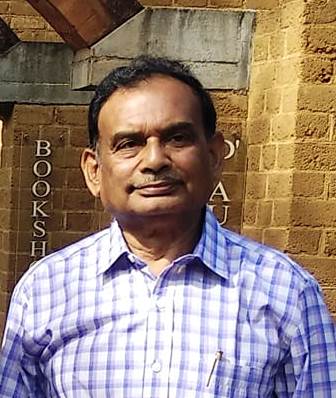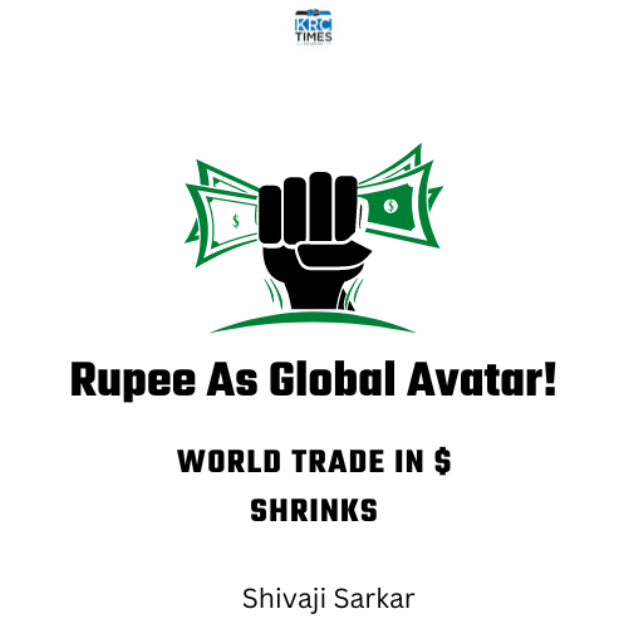True, the US dollar holds the sway but countries like India are taking baby steps to look beyond
 Shivaji Sarkar
Shivaji Sarkar

A failed experiment with the UK Prime Minister Liz Truss, who quit office in 44 days, has shaken the once mighty kingdom and globalised market, which breathes a sigh of relief hoping credibility to return, as London still controls major world trading of bullion to metals. No less a shock it was for India as it has been talking to Truss since she was the relevant minister for carrying on talks for free trade agreement (FTA) hoping to export more and earn hard currency.
A super 13.3 per cent inflation driven, jobless, uncertain British economy was a bit too much for Truss to manage through populism of tax cuts and other sops. Perhaps more than that Truss does not know how to manage her own MPs, after she defeated Rishi Sunak, all Sunak friends were put out of the government. The fissure and her fast-shifting stance played the worse. Neither populism worked in an economy having galloping inflation nor she was able to remain firm on her decisions, a normal attribute of politicians. She collapsed but sent a signal that those indulging in populism need to have abundant caution as with her the industry, investors, and the stocks go tizzy.
India which has been priding itself on replacing the UK as the fifth biggest economy is itself in shock, whether it has surpassed the UK or something left to be done. Rarely before a premier of six weeks has shaken not only its economy but also major world currencies. One wonders whether her persona was so weak or the Russian President Vladimir Putin and US President Joe Biden’s tangle in NATO supported Ukraine war took her toll. The European crisis is not easy as the EU does neither know whether to jump into the war or face an unprecedented energy crisis. Biden-Putin duo’s animosity triggered sanctions to ensure that the continent instead of renewable energy goes back to coal and other fossil fuel.
The plunging currencies amid 8.2 percent inflation are the other shock. The sterling pound is crashing against a continuously rising dollar. So is the Euro. Have they become lackeys of the US? The US despite its economy not in the pink, faces an uncertain market and the NATO countries stare at an unknown future.
True, the US dollar holds the sway but countries like India are taking baby steps to look beyond. Amid rising purchases of Russian crude oil, a Russian bank opens an account in India’s Yes Bank in September. Saudi Arabia and India discuss rupee-riyal trade. The State Bank of India advises Indian exporters to avoid trade in dollars with countries like Bangladesh. Many nations are looking at alternate currencies to the dollar, which still enjoys dominance in the global market and reserves.
The International Monetary Fund says despite the dominance the dollar is losing its share in global foreign exchange reserves from about 72 per cent in 2000 to about 60 per cent in 2022. Major currencies gaining share are Euro, Pound, and Chinese renminbi. Recently, India’s Chief Economic Advisor V Anantha Nageswaran said that while weaponisation of currencies or forex was the current trigger for countries to explore alternate arrangements, internationalising the rupee was a “logical evolution”.
In a limited way, the rupee is accepted in Vietnam, Indonesia, Paraguay, Chile, Costa Rica, and Hungary. The Indian rupee is considered equivalent to 305 Vietnamese dongs and 192.11 to the Indonesian Rupiah.
India is majorly using roubles to buy crude oil from Russia. It offers discounts and bears the transportation and insurance costs. Oil purchases from Russia almost trebled from $5.3 billion in 2021-22 to $14.5 billion in just five months. The Russian share of total imports by India rise from 2.5 per cent to 11.4 per cent, according to the Commerce Ministry. Till 2019, 50 per cent of Indian payments to Russia was in dollars. From 2021, with the S-400 air defence deal, it has risen to 53.4 per cent of Indian transactions in roubles and 38.3 per cent in dollars.
Britain remaining the politically most unstable with low growth if not corrected sooner may lose even Indian interest in having the FTA. The Indian perception is that the UK still has command over the world economy. If that is lost the FTA would add little for India. Still, except for the juggled up total figures, the UK economy is stronger than many economies.
Similarly, India still has about 86 per cent of the foreign trade in dollars – 86.6 per cent of exports and 86.3 per cent of imports. In other currencies it has traded in Euro, exports 7.4 per cent and imports 8.8 per cent; other currencies (yen, renminbi, Canadian dollar, Swiss franc and Australian dollar) 3.8 per cent exports and 3.3 per cent imports; British Pound 2.4 per cent exports and 0.5 per cent imports; and Japanese yen 0.1 per cent exports and 1.1 per cent imports.
India is trying to diversify despite being anchored in dollars. With problems besotting the domestic market, slower growth, though apparently faster than many countries, inflation, and limited job opportunities, social angst subsided with free food dole to 800 crore people, despite a tough road. Because of a strong Prime Minister Narendra Modi, it is gradually sailing through with billions of rupee packages of infra-related programmes. The major civic activities the government believes would lead the country out of the covid pandemic induced morass.

Truss could not face a similar situation and preferred to resign. It proved that it is not enough to be a party leader without team spirit and managerial skills. That is keeping India passing through the unsavoury phase. Modi hopes announcements of packages in poll-bound Gujarat, Himachal Pradesh, and Uttarakhand are likely to lead the country to an improvement.
The Economist in its review says digitisation, successful start-ups, and the green transitions have led India to become the world’s fastest-growing economy, However, the climate, energy, and food crises; and a socio-political environment could be dampeners in the country’s bright prospects.
The UNCTAD lauds India’s continuing free food drive and calls for cuts in global food prices for ensuring food security worldwide, especially in developing countries through the Black Sea grain initiative, crucial for Europe and adjacent areas. This is expected to keep currencies stable, so necessary for India to face high import prices.
The currency management and rupee trade in larger areas being planned is likely to be a panacea for a long-term solution to the forex crisis and ensure a better future for the country.—INFA
Advertisements | KRC Foundation





